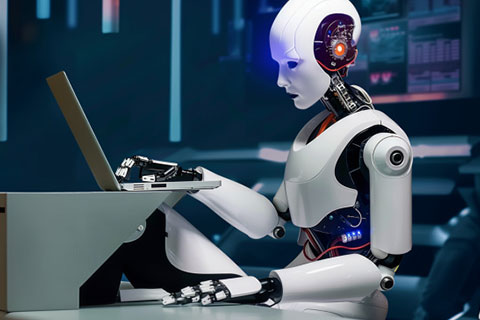The booming gig economy, the expandation of remote work, and cutting-edge technology are all contributing to an exciting revolution in the workplace. These changes are more than just fads as the twenty-first century progresses; they’re creating avenues to a vibrant future full of limitless opportunities!
We’ll explore the fascinating trends that are changing the way we work, analyze the style, and learn how individuals and organizations can adjust to not only survive but also thrive in this exciting new era in this blog. Prepare to welcome the workplace of the future!
Hybrid Work the New Normal
The way we work is changing thanks to hybrid workspaces, which give staff members a combination of flexibility and in-office collaboration. The advantages of this model are evident, as evidenced by the 62% of workers who chose it: reduced commute times, improved work-life balance, and increased productivity. The prevalence of full-time remote work is declining as businesses try to strike a balance between employee and group collaboration. Indeed, 81% of workers are predicted to use hybrid work, with Gen Z driving this trend.
Whether you’re facing a career change or layoffs, being adaptable with your commute and in-office days can lead to greater opportunities. Employers and workers must collaborate to develop a working model that meets the needs of all parties.
Automation and AI are Changing the Workplace
The workplace is rapidly changing due to automation and artificial intelligence (AI), which increases task efficiency and frees up time for problem-solving and creativity. AI is predicted to create 97 million new opportunities and replace 85 million jobs by 2025. AI is more likely to alter roles than to replace them, despite the concerns of certain workers that their jobs may be in jeopardy.
To survive in this shifting environment, businesses will need to adjust, reevaluate job roles, and concentrate on acquiring new skills, as AI tools now handle over 70% of data-intensive tasks.
Improving Workplace Environment
The future workplace is expected to define itself by emphasizing the employee experience. Prioritizing employee satisfaction and well-being allows organizations to foster innovation and success. Important tactics consist of:
- Offering the Correct Tools: Giving staff members the tools they need promotes efficiency and a feeling of direction.
- Assessing Data: Utilizing data to comprehend worker needs aids in disengagement detection and turnover prediction.
- Cultivating Culture: Collaboration and workplace culture are strengthened when individual goals and company goals are in line.
- Businesses that make these investments develop a more motivated and engaged workforce, which in turn shapes a workplace that is more adaptable and resilient in the future.
Prioritizing Employee Well-being and Mental Health
Business leaders now place a high premium on employee well-being, with 80% of executives acknowledging the connection between it and retention and productivity.
Companies are implementing comprehensive wellness strategies to address the varied needs of their workforce:
- Mental Health Support: Availability of stress reduction, counseling, and meditation programs.
- Wellness Amenities: Tailored choices such as telemedicine, healthy meal services, and gym memberships.
- Building Connections: Social clubs and team trips to fight loneliness and fortify relationships. Businesses build a resolute, supportive workforce by making investments in these areas.
Adopting DEI as a Central Principle
Diversity, equity, and inclusion (DEI) will become a central component of organizational operations by 2024. DEI will become an integral part of the company’s culture, not an afterthought. Everyone feels heard and respected in businesses that see DEI as a shared responsibility, regardless of background.
This change gives businesses a competitive edge by encouraging creativity and innovation in addition to increasing employee engagement. Organizations can create vibrant workplaces where multiple viewpoints drive glory and foster a sense of community for all by embracing DEI in day-to-day practices.
Rethinking Hiring: Stressing Skills Over Degrees
The employment market is changing as companies place a higher value on skills than degrees. A greater range of talent is being able to shine thanks to major companies like Google and Delta Airlines removing their degree requirements.
Moreover, this is especially true for Skilled Through Alternative Routes (STARs) candidates like veterans and diverse candidates. This move promotes inclusivity and gives companies the ability to develop talent through customized training and apprenticeship programs, which in turn promotes growth and innovation in the current competitive market.
Metaverse in Cooperative Projects
Virtual reality is changing the rules for learning and collaboration, transforming the way we work together. We can create immersive environments that connect on-site, remote, and hybrid teams by fusing virtual reality, augmented reality, and holograms. This new strategy improves training and mentoring, increasing the effectiveness and engagement of interactions in our ever-changing workplaces.
Evolving Career Paths
As workers embrace more varied journeys, the idea of a linear career path is becoming less and less prevalent. Many are abandoning conventional roles; according to a Pew research study, 19% of Americans 65 and older were employed in 2023, nearly twice as many as they were 35 years earlier.
There are various ramifications for organizations from this shift:
- Encouraging Flexibility: To help workers successfully balance their personal and professional lives, employers are offering flexible work arrangements like job sharing and gig opportunities.
- Acknowledging Diverse Expertise: Employers are putting more emphasis on skill than experience when selecting employees, putting younger workers in positions that make the most of their unique viewpoints and knowledge.
- Getting Ready for Retirement Waves: To ensure a seamless transition for the upcoming generation, organizations are improving cross-training initiatives and setting up mentorship programs to preserve knowledge as seasoned employees retire.
This changing environment helps to promote workplace diversity and puts businesses in a strong position to prosper in the face of change.
Micro-Credentials: The Learning of the Future
The methods we learn also change as the workplace does. In an increasingly competitive job market, micro-credentials and customized learning pathways are becoming the go-to options for remaining relevant. These compact certifications enable you to pick up new skills fast, making them ideal for adjusting to the constantly shifting requirements of your position. They’re quick, targeted, and made to keep you and your business ahead of the curve in this age of rapid innovation—unlike traditional degrees.
Fostering Adaptability and Transparency for the Success of Organizations
Promoting transparency is essential for creating an inclusive culture as workplaces change. Leaders should make sure that staff members understand how decisions are made and how they contribute to developing solutions. Organizations have adopted virtual collaboration tools to increase creativity and productivity as a result of embracing disruptive change.
Companies can create a purpose that inspires workers and increases productivity by harmonizing their mission and values. This strategy guarantees sustainable growth in an evolving setting while also empowering teams.
Exploring Side Hustles for a Secure Future
With 50% of millennials and 70% of Gen Z juggling multiple sources of income to keep up with rising living expenses, side gigs are becoming more and more popular, especially among younger generations. The surge in influencer marketing, estimated to be worth $21.1 billion by 2023, demonstrates the breadth of these prospects.
If you’re happy where you work, think about launching a side business as a prudent financial safety net.
Conclusion
The workplace is changing at a breakneck pace, and if you ignore these changes, your career may feel directionless and stagnant. By embracing upcoming workplace trends, you can foster an environment of openness and honesty that encourages your coworkers to succeed and develop.
Additionally, utilizing cutting-edge resources and insights can keep your company in the game. Thus, maintain your curiosity and flexibility—this trip should be both thrilling and fulfilling!






